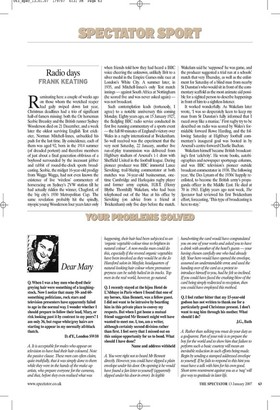Radio days
FRANK KEATING Ruminating here a couple of weeks ago on those whom the wretched reaper had gaily swiped down last year, Christmas deadlines had a trio of significant hall-of-famers missing: both the Oz horseman Scobie Breasley and the British runner Sydney Wooderson died on 21 December, and a week later the oldest surviving English Test cricketer, Norman Mitchell-Innes, unbuckled his pads for the last time. By coincidence, each of them was aged 92, born in the 1914 summer (of dreaded portent) and therefore members of just about a final generation oblivious of a boyhood surrounded by the incessant jabber and rabbit of round-the-clock sports broadcasting. Scobie, the midget 16-year-old prodigy from Wagga Wagga, had not even known the existence of live 'wireless' commentary of horseracing on Sydney's 2VW station till he had actually ridden the winner, Chagford, of the big city's 1930 Metropolitan Cup. The same revelation probably hit the spindly, myopic young Wooderson four years later only when friends told how they had heard a BBC voice cheering the unknown, unlikely Brit to a silver medal in the Empire Games mile race at London's White City. A summer later, in 1935, and Mitchell-Innes's only Test match innings — against South Africa at Nottingham (he scored five and was never asked again) — was not broadcast.
Such contemplation leads (tortuously, I agree) to a notable anniversary this coming Monday. Eighty years ago, on 15 January 1927, the fledgling BBC radio service conducted its first live running commentary of a sports event — the full 80 minutes of England's victory over Wales in a rugby international at Twickenham. So well received was the experiment that the very next Saturday, 22 January, another live run-of-play transmission was delivered from Highbury stadium of Arsenal's 1-1 draw with Sheffield United in the football league. Daring pioneer producer was BBC immortal Lance Sieveking; trail-blazing commentator at both matches was 34-year-old businessman, onetime Cambridge and Harlequins rugby player and former army captain, H.B.T. (Henry Blythe Thornhill) Wakelam, who had been telephoned out of the blue at his office by Sieveking (on advice from a friend at Twickenham) only five days before the match.
Wakelam said he 'supposed' he was game, and the producer suggested a trial run at a schools' match that very Thursday, as well as the enlistment for Saturday of a blind man from nearby St Dunstan's who would sit in front of the commentary scaffold as the most animate aid possible for a sighted person to describe happenings in front of him to a sightless listener.
It worked wonderfully. As Wakelam later wrote, 'I was so desperately keen to keep my man from St Dunstan's fully informed that I raced away like a maniac.' First rugby try to be described on radio was scored by Wales's formidable forward Rowe Harding, and the following Saturday at Highbury football commentary's inaugural goal was booted in by Arsenal's centre-forward Charlie Buchan.
Wakelam himself became British broadcasting's first 'celebrity'. He wrote books, autobiographies and newspaper sportspage columns, and was BBC television's pioneer outside broadcast commentator in 1938. The following year, `the Des Lynam of the 1930s' happily reenlisted, to become the British army's propaganda officer in the Middle East He died at 70 in 1963. Eighty years ago next week, The Spectator had reviewed his first Twickenham effort, forecasting, 'This type of broadcasting is here to stay.'






















































 Previous page
Previous page